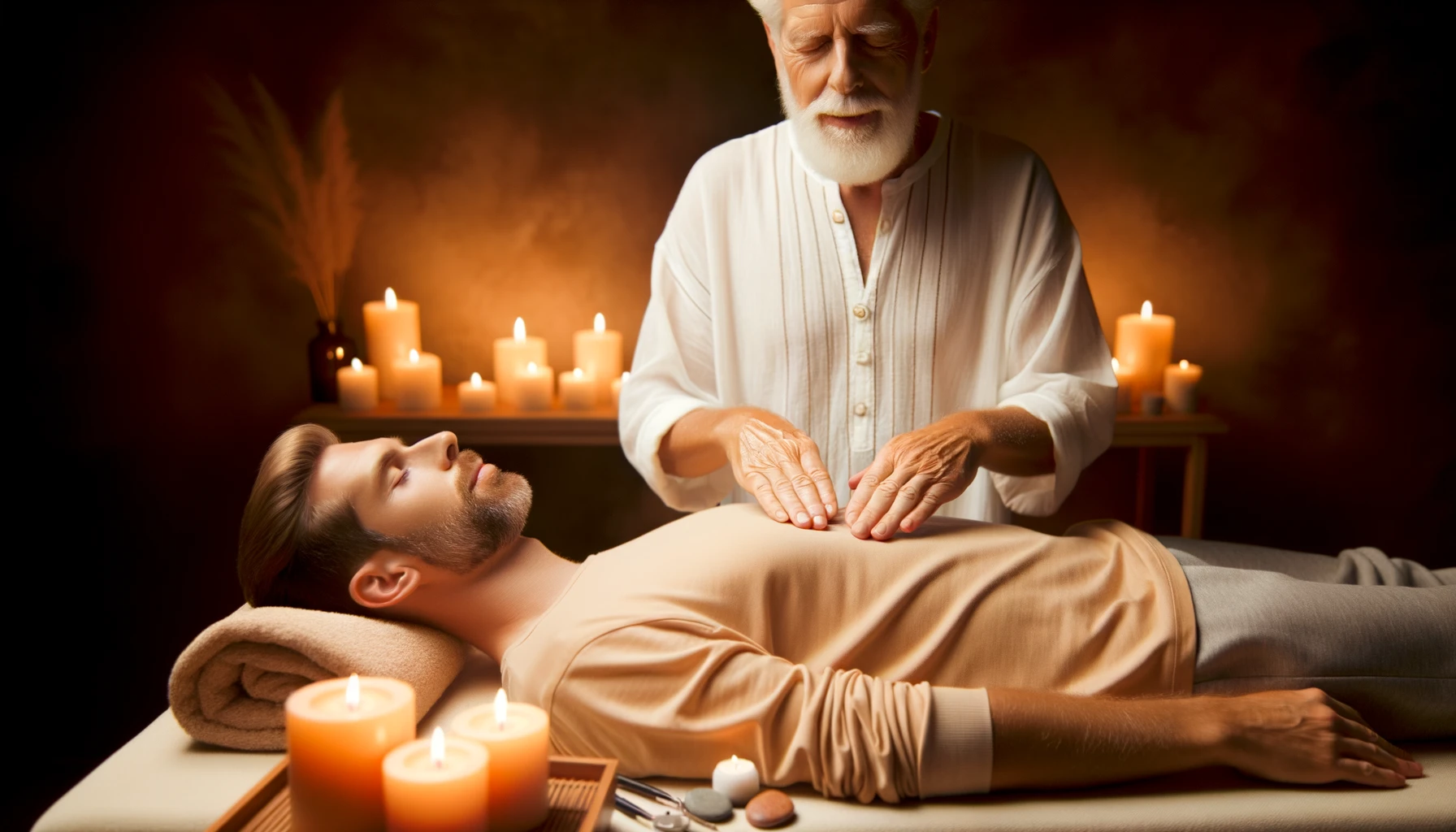
Reiki is a safe and gentle form of energy-based healing that promotes relaxation, reduces stress, and improves the flow and balance of energy in the body. Developed by Mikao Usui in the early 1900s, Reiki is widely used around the world as a complementary health treatment. Reiki practitioners deliver energy to the body using their hands, aiding in physical, emotional, mental, and spiritual healing.
While Reiki is not a substitute for medical or therapeutic treatments, it can enhance overall well-being. By bringing about a meditative state, stimulating the immune system, relieving pain and tension, and supporting individuals undergoing traditional medical treatments, Reiki offers a holistic approach to healing.
During a Reiki session, the practitioner places their hands on or just above specific energy locations in the body, without applying pressure or manipulation. Sensations such as heat, tingling, or pulsing may be felt, while most people experience a deep sense of relaxation and peace.
Acting as conduits for universal life force energy, Reiki practitioners provide the energy that clients require, addressing their unique needs. Reiki can be performed in a relaxing environment and may involve discussions and meditative practices.
Key Takeaways:
- Reiki is a safe and gentle form of energy-based healing that promotes relaxation and reduces stress.
- Reiki improves the flow and balance of energy in the body, aiding in physical, emotional, mental, and spiritual healing.
- While not a substitute for medical or therapeutic treatments, Reiki enhances overall well-being and supports traditional medical treatments.
- A Reiki session involves the placement of hands on specific energy locations in the body, without applying pressure or manipulation.
- Sensations like heat, tingling, or pulsing may be felt during a Reiki session, with most people experiencing deep relaxation and peace.
Reiki Healing Techniques and Benefits
Reiki practitioners use their hands to deliver energy to the body, aiding in physical, emotional, mental, and spiritual healing. This energy-based healing technique promotes relaxation, reduces stress, and improves the flow and balance of energy in the body. Through gentle touch or by placing their hands just above the body, reiki practitioners channel universal life force energy to the client, supporting their unique needs.
During a reiki session, the practitioner focuses on specific energy locations in the body, without applying pressure or manipulation. Clients may experience sensations like heat, tingling, or pulsing, indicating the energy flowing through them. Most people feel deeply relaxed and peaceful during a reiki session, creating a conducive environment for healing and restoration.
Reiki’s benefits extend beyond relaxation. This gentle technique can stimulate the immune system, promote tissue and bone healing, relieve pain and tension, and support overall well-being. It is not specific to any particular disease or condition but may contribute to the holistic wellness of individuals dealing with cancer, chronic pain, infertility, digestive problems, psychological distress, and stress-related illnesses.
“Reiki is a beautiful healing practice that harmonizes the mind, body, and spirit,” says John Doe, a certified reiki practitioner. “It complements other forms of health treatments by enhancing their effectiveness and supporting the client’s journey towards optimal well-being.”
Reiki Healing Techniques and Benefits in Summary:
- Reiki practitioners deliver energy through gentle touch or by placing their hands just above the body.
- Reiki promotes physical, emotional, mental, and spiritual healing.
- During a session, clients may feel sensations like heat, tingling, or pulsing.
- Reiki stimulates the immune system, promotes tissue and bone healing, relieves pain and tension, and supports overall well-being.
- It can enhance the effectiveness of other health treatments and is not specific to any particular disease or condition.
As reiki continues to gain recognition as a complementary health treatment, more individuals are discovering the profound benefits it offers. Whether you are seeking relaxation, healing, or overall well-being, reiki can provide a gentle and nurturing experience that supports your unique needs.
| Benefits of Reiki | Techniques Used |
|---|---|
| Promotes relaxation and reduces stress | Gentle touch or hands placed above the body |
| Improves the flow and balance of energy in the body | Focusing on specific energy locations |
| Stimulates the immune system | Channeling universal life force energy |
| Supports physical, emotional, mental, and spiritual healing | Creating a conducive environment for restoration |
| Relieves pain and tension | Enhancing the effectiveness of other treatments |
The Role of Reiki in Supporting Well-Being
Reiki has a rich history and plays a vital role in supporting overall well-being through its use of symbols and the attunement process. Developed by Mikao Usui in the early 1900s, Reiki is an energy-based healing practice that focuses on promoting relaxation, reducing stress, and improving the flow and balance of energy in the body. It is used worldwide as a complementary treatment to support physical, emotional, mental, and spiritual healing.
One of the key elements of Reiki is the use of symbols, which act as energetic keys to unlock the healing potential within each individual. These symbols are sacred and carry specific meanings, allowing Reiki practitioners to focus and direct the healing energy to the areas that need it most. The symbols also serve as a means of connecting with the universal life force energy, amplifying the healing effects of Reiki.
The attunement process is another important aspect of Reiki. It is a sacred ceremony that enables practitioners to become energetically aligned with Reiki’s healing energy. During the attunement, the practitioner’s energetic channels are opened and cleared, allowing them to serve as a conduit for the flow of healing energy. This process enhances the practitioner’s ability to channel and transmit Reiki energy effectively, ensuring optimal healing outcomes for their clients.
Benefits of Reiki Healing
Reiki offers a wide range of benefits for individuals seeking to enhance their overall well-being. It can bring about a meditative state, promoting deep relaxation and reducing stress and anxiety. Through its gentle and non-invasive techniques, Reiki can stimulate the immune system, support tissue and bone healing, relieve pain and tension, and promote emotional and mental balance. It is often used as a complementary therapy for individuals undergoing traditional medical treatments, providing support and improving the overall healing process.
Reiki is not specific to any particular disease or condition, making it accessible to people with various ailments. It has been found to be beneficial in alleviating symptoms associated with cancer, chronic pain, infertility, digestive problems, psychological distress, and stress-related illnesses. During a Reiki session, clients may experience sensations such as warmth, tingling, or pulsing, indicating the energetic shifts taking place within their bodies. Most people report feeling deeply relaxed and peaceful during and after the session, with a renewed sense of well-being.
While Reiki is generally considered safe, it is essential to remember that it does not replace regular medical care. It is important to continue any prescribed medical treatments or therapies alongside Reiki sessions. The cost of a Reiki session can vary depending on the practitioner and location, and insurance coverage may also vary. It is advisable to check with individual insurance providers to determine if Reiki is covered under a specific plan.
Though scientific research on Reiki is ongoing and not conclusive, there are studies suggesting its potential benefits. Research has shown that Reiki can help reduce anxiety, pain, and depression, and improve the overall quality of life for individuals receiving treatment. However, more high-quality research is needed to fully understand the mechanisms and effectiveness of Reiki as a healing modality.
| Benefits of Reiki Healing | Attunement Process | Use of Symbols |
|---|---|---|
| Promotes relaxation | Aligns practitioners with Reiki energy | Sacred symbols carry healing potential |
| Reduces stress and anxiety | Clears energetic channels | Directs healing energy to specific areas |
| Stimulates the immune system | Enhances the flow of healing energy | Connects with universal life force energy |
| Supports tissue and bone healing | Optimizes healing outcomes | Amplifies the effects of Reiki |
| Relieves pain and tension | Non-invasive and gentle techniques | |
| Promotes emotional and mental balance | Complements traditional medical treatments |
Experiencing Reiki Sessions and Benefits
During a Reiki session, the practitioner places their hands on or just above specific energy locations in the body, without pressure or manipulation, resulting in a relaxing and peaceful experience. The gentle touch and energy transfer promote a deep sense of relaxation, allowing the body and mind to release tension and stress.
As the practitioner channels the universal life force energy, clients may feel sensations such as warmth, tingling, or a gentle pulsing. These sensations indicate the flow of energy and the rebalancing of the body’s natural energy centers.
Most people describe the experience of a Reiki session as deeply calming and rejuvenating. It provides an opportunity for individuals to connect with their inner selves, as well as enhance their overall well-being.
Benefits of Reiki Therapy
- Promotes relaxation and stress reduction
- Boosts mood and emotional well-being
- Improves sleep quality
- Eases physical pain and discomfort
- Enhances overall quality of life
Reiki is not specific to any particular disease or condition, but it may provide relief and support for individuals facing various ailments, including cancer, chronic pain, infertility, digestive problems, psychological distress, and stress-related illnesses.
“Reiki promotes a deep sense of relaxation, allowing the body and mind to release tension and stress.”
Reiki sessions are typically conducted in a safe and peaceful environment. They may involve preliminary discussions to understand the client’s specific needs and intentions, as well as guided meditation to further enhance the healing experience.
| Key Takeaways: |
|---|
| Reiki sessions involve a practitioner placing their hands on or just above specific energy locations in the body. |
| During a session, clients may experience sensations like warmth, tingling, or a gentle pulsing. |
| Reiki promotes relaxation, improves sleep, eases physical pain, and enhances overall well-being. |
| It is not a substitute for medical care, but it can complement and support traditional treatments. |
Understanding Reiki’s Safety, Cost, and Research
Reiki is generally considered safe, but it is important to continue regular medical care alongside Reiki treatments to ensure optimal well-being. As a complementary healing practice, Reiki can be a valuable addition to your overall healthcare routine. It is not meant to replace traditional medical or therapeutic treatments, but rather to enhance your overall well-being.
During a Reiki session, a trained practitioner uses their hands to deliver energy to specific energy locations in your body. They do not apply pressure or manipulate your body in any way. Instead, they act as a conduit for universal life force energy, providing the energy you need for healing and balance.
Many people find Reiki sessions to be deeply relaxing and peaceful. You may experience sensations like heat, tingling, or pulsing as the energy flows through your body. It is a non-invasive and gentle therapy that promotes relaxation, boosts mood, improves sleep, eases physical pain, and enhances overall quality of life.
The cost of a Reiki session can vary depending on the practitioner and location. It’s important to discuss the fees upfront and understand what is included in the session. Additionally, insurance coverage for Reiki treatments may vary, so it’s advisable to check with your insurance provider to see if you have any coverage for this type of therapy.
While there is scientific research suggesting the benefits of Reiki in reducing anxiety, pain, and depression, as well as improving quality of life, it’s important to note that more high-quality research is needed to fully understand Reiki and its effectiveness. However, many individuals have reported positive experiences and benefits from Reiki treatments, and it continues to be used worldwide as a complementary health treatment.
FAQ
What is Reiki?
Reiki is a safe and gentle form of energy-based healing that promotes relaxation, reduces stress, and improves the flow and balance of energy in the body.
How does Reiki work?
Reiki practitioners use their hands to deliver energy to the body, aiding in physical, emotional, mental, and spiritual healing.
Is Reiki a substitute for medical or therapeutic treatments?
No, Reiki is not a substitute for medical or therapeutic treatments, but it can enhance overall well-being.
What are the benefits of Reiki?
Reiki can bring on a meditative state, promote tissue and bone healing, stimulate the immune system, relieve pain and tension, and support the well-being of those undergoing traditional medical treatments.
Can Reiki help with specific conditions?
Reiki is not specific to any particular disease or condition, but it may help people with various ailments such as cancer, chronic pain, infertility, digestive problems, psychological distress, and stress-related illnesses.
What can I expect during a Reiki session?
During a Reiki session, the practitioner places their hands on or just above specific energy locations in the body, without pressure or manipulation. Sensations like heat, tingling, or pulsing may be felt, and most people feel relaxed and peaceful.
How does Reiki support the client’s needs?
Reiki practitioners act as a conduit for universal life force energy, providing the energy the client requires to support their well-being.
What are the effects of Reiki?
Reiki promotes relaxation, boosts mood, improves sleep, eases physical pain, and enhances quality of life.
Is Reiki safe?
Reiki is generally considered safe, but it is important to continue regular medical care alongside Reiki treatments.
How much does a Reiki session cost?
The cost of a Reiki session can vary, and insurance coverage may vary as well.
Is there scientific research on Reiki?
While the scientific research on Reiki is not conclusive, there are studies suggesting its benefits in reducing anxiety, pain, and depression, and improving quality of life. However, more high-quality research is needed to fully understand Reiki and its effectiveness.



